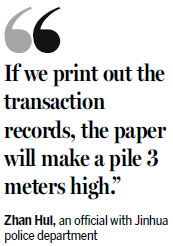More than 3,000 accounts frozen, 58 suspects arrested following lengthy police investigation
Police in Jinhua, Zhejiang province, have busted an underground banking case involving transactions up to 410 billion yuan ($64 billion).
It is the largest of its kind and also the first involving the conversion of Chinese yuan into foreign currencies via nonresident accounts, the Ministry of Public Security said on Thursday.
A total of 100 suspects from eight gangs have been detained since local police started the investigation last September.
Zhang Hui, an official with Jinhua police department, said that the ringleader, surnamed Zhao, had registered more than 80 shell companies in the Chinese mainland and Hong Kong to operate foreign exchange transactions and money laundering.
"He had about 370 offshore bank accounts and more than 100 nonresident accounts registered under his companies to transfer money," he said.
In December, more than 3,000 bank accounts in 31 provinces were frozen and 58 suspects were arrested.
Zhang said that local police, together with financial and foreign currency experts, spent almost a year to sort out 1.3 million suspicious transactions from the accounts.
"If we print out the transaction records, the paper will make a pile 3 meters high," he said.
Zhang said that the gangs made money by charging commissions up to 0.5 percent. Account books of one gang showed that the gang's average daily income was 50,000 yuan, while the income from January to October 2014 amounted 20.7 million yuan.
One gang leader, surnamed Yang, said in an interview with Xinhua News Agency that he can gather hundreds of millions of yuan within a short time to meet clients' needs.
"We have very good credit so that many people come to us to avoid banks' strict foreign currency exchange regulations," he said in the interview.
The case might reveal just the tip of the iceberg of underground banking activities in China.
Ouyang Xiong, a senior official at the State Administration of Foreign Exchange, said underground banking activity is so clandestine and the throughput of illegal assets so large that it's difficult to accurately assess the scale of the problem.
"A large amount of untraced cross-border capital has been 'freed' from the State's financial regulatory system. That has created a huge funding black hole that is seriously disrupting the nation's financial management and endangering economic security," he said.
China started a crackdown on underground banks in April. The crackdown, jointly launched by the Ministry of Public Security, SAFE and the People's Bank of China, has so far busted over 170 cases of money laundering and illegal fund transfers involving more than 800 billion yuan.
yanyiqi@chinadaily.com.cn

|
Forged seals and bank cards used for transferring money are displayed by police after they busted an underground banking case in Jinhua, Zhejiang province. Provided by Ministry of Public Security |
(China Daily 11/21/2015 page4)
